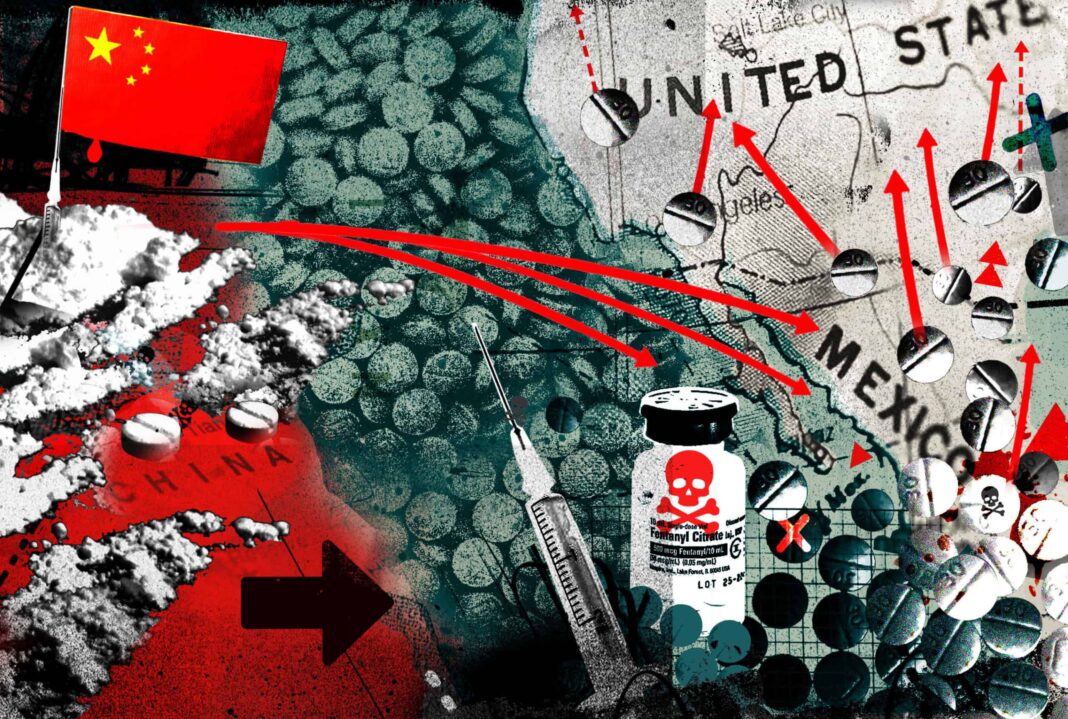The fentanyl crisis is more than a public health emergency; it is a complex geopolitical challenge that echoes historical struggles over substance abuse and societal control. This synthetic opioid, primarily manufactured with precursors from China and processed through Mexico, has become a scourge of modern society. The crisis has devastated communities, exacerbated international tensions, and highlighted the dark interplay of economic competition, resource exploitation, and political maneuvering.
A Reverse Opium War?
The history of the 19th-century Opium Wars serves as a haunting parallel to today’s fentanyl epidemic. Mao Zedong referred to that era as the “century of humiliation,” during which China was crippled not only by Western domination in trade and military affairs but also by the destructive impact of opium addiction. The drug left an indelible mark on Chinese society, shaping its modern identity.
Today, the situation seems reversed. From 2015 to 2021, the United States recorded an alarming rise in overdose deaths, doubling from 52,000 to over 107,000 annually. Fentanyl, sometimes called the “zombie drug” for its devastating physical and psychological effects, is the main driver of this surge. It is 100 times more potent than morphine and 50 times stronger than heroin; a mere 2 milligrams can be lethal. This epidemic has led some to describe the fentanyl trade as a quiet, insidious “reverse Opium War,” more deadly than its historical counterpart.
China’s Role in the Fentanyl Trade
China’s chemical industry, one of the largest in the world, plays a pivotal role in the production of fentanyl. While China has taken steps to regulate fentanyl and its precursors, including agreements with the United States to crack down on illegal production, enforcement remains inconsistent. Certain Chinese companies exploit regulatory gaps, producing and exporting precursor chemicals disguised as legitimate products.
The issue is not simply a matter of illicit activity; it also reflects broader economic and political dynamics. The unregulated export of these chemicals is a byproduct of a global competition where state subsidies, unfair market practices, and resource exploitation intersect. The fentanyl crisis exemplifies how these forces can destabilize societies, highlighting the need for international cooperation and stricter oversight.
Mexico: The Crucial Transit Point
Once Chinese precursors leave their origin, they often transit to Mexico, where powerful drug cartels synthesize them into fentanyl. The Sinaloa Cartel and the Jalisco New Generation Cartel (CJNG) dominate this trade, leveraging Mexico’s weak regulatory systems, corruption, and strategic geography.
Major ports like Manzanillo and Lázaro Cárdenas serve as entry points for Chinese chemicals. From there, these precursors are transported to clandestine labs where fentanyl is manufactured. The finished product is smuggled into the United States, hidden in vehicles, shipments, or even disguised as legitimate medications. Cartels exploit every opportunity, including using tunnels, drones, and less-patrolled borders, to move their products.
The U.S. Response
The human cost of fentanyl is staggering, with synthetic opioids now the leading cause of death among Americans aged 18-49. Recognizing the gravity of the crisis, U.S. administrations have taken action. Former President Donald Trump imposed tariffs on China and Mexico, citing their roles in the fentanyl trade. While the Biden administration has also reached agreements with China to curb illegal exports, progress has been limited.
Despite some diplomatic successes, fentanyl continues to flood American streets, a testament to the resilience of illicit networks and the complexity of international drug enforcement. Addressing the crisis requires a comprehensive approach that tackles each link in the supply chain.
A Multifaceted Battle
Fentanyl is more than just a drug; it symbolizes the intersection of economic, political, and societal vulnerabilities. The trade thrives on global inequalities and weak regulatory systems, feeding off corruption and the demand for cheap, potent narcotics. To counter this, several measures are essential including and not limited to Stricter Regulation in China: Enhancing oversight of chemical industries and cracking down on illicit exports are critical. International pressure and collaboration can help enforce compliance. Combating Cartels in Mexico: Dismantling production and distribution networks requires coordinated efforts between Mexico and the U.S., including targeting precursor imports and addressing corruption. Enhanced Border Security: Strengthening detection technologies and increasing inspections can intercept fentanyl shipments before they reach communities. Public Health Strategies: Reducing demand is vital. Expanding access to treatment, education, and harm reduction initiatives can save lives and diminish the drug’s market.
A Modern Challenge with Historical Lessons
The fentanyl crisis, with its roots in economic exploitation and geopolitical tensions, draws stark comparisons to historical opium trade dynamics. Like the opium that once weakened China, fentanyl is now devastating communities and challenging the stability of societies and China’s communist party (CCP) seems to be using fentanyl to weaken the United States.
This is more than a battle against a drug; it is a fight to preserve societal health, economic stability, and global trust by combating the CCP’s project. By addressing the crisis as a multifaceted problem that transcends borders, the international community has to confront this modern “war” and work toward lasting solutions.
europeantimes.org

